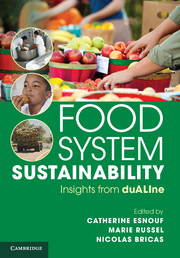Book contents
- Frontmatter
- Contents
- Foreword
- Acknowledgements
- Introduction
- 1 Context: new challenges for food systems
- 2 Consumption and consumers
- 3 Carbon footprint and nutritional quality of diets in France
- 4 Food systems
- 5 Industrial organisation and sustainability
- 6 Urbanisation and the sustainability of food systems
- 7 Losses and wastage
- 8 International trade, price volatility and standards for sustainability
- 9 Elements for a foresight debate on food sustainability
- 10 A critical panorama of methods used to assess food sustainability
- Conclusion
- References
- List of abbreviations
- List of duALIne experts
- Index
Conclusion
Published online by Cambridge University Press: 05 April 2013
- Frontmatter
- Contents
- Foreword
- Acknowledgements
- Introduction
- 1 Context: new challenges for food systems
- 2 Consumption and consumers
- 3 Carbon footprint and nutritional quality of diets in France
- 4 Food systems
- 5 Industrial organisation and sustainability
- 6 Urbanisation and the sustainability of food systems
- 7 Losses and wastage
- 8 International trade, price volatility and standards for sustainability
- 9 Elements for a foresight debate on food sustainability
- 10 A critical panorama of methods used to assess food sustainability
- Conclusion
- References
- List of abbreviations
- List of duALIne experts
- Index
Summary
Because of the approaches adopted according to their links to and potential impacts on food sustainability, the discussions that took place in the context of duALIne were designed to compile an inventory of the principal determinants governing past trends in food systems, to identify the critical points in these systems with respect to environmental, social, health and economic issues, and finally to highlight research questions that could be addressed by programmes in the future. This conclusion presents the main findings of this analysis, a summary of the research themes determined, subjects that still need to be explored and the prospects offered.
Western-style food systems are not sustainable
It is clear from the scientific literature that Western-style food systems, and of course their global extension, are not sustainable in terms of their consumption of resources, impacts on ecosystems and effects on health (overweight, obesity and associated pathologies). The central question is thus to determine which trends, which transitions or even which ruptures could lead to the emergence of more sustainable systems (integrating both the supply of products and the demands of food consumers).
- Type
- Chapter
- Information
- Food System SustainabilityInsights From duALIne, pp. 233 - 246Publisher: Cambridge University PressPrint publication year: 2013



